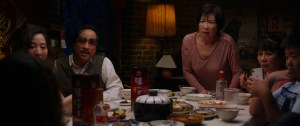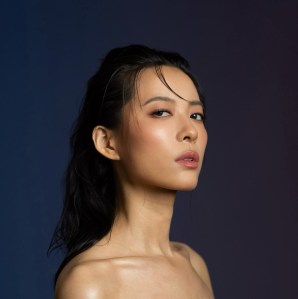What happens when generational dependency causes a pressurized role reversal that is both tender and heartbreaking when the child becomes the caretaker, and the mother becomes the dependent? Writer-director Ziyu Luo explores this intricate and delicate dynamic in her debut short film, American Daydream. Set in New York’s Chinatown, the story centers on the life of Marilyn (Jessica Lee), a young Chinese American gynecologist who yearns to follow her dreams of moving to Los Angeles and trying her hand at acting. The only caveat is the guilt she carries from potentially leaving her undocumented immigrant mother (Yan Cui), who has come to rely on her for survival in the U.S.
Here with Deadline, Luo breaks down her poignant story of love, sacrifice and our difficult bonds with our families.
DEADLINE: How did you end up in filmmaking? Were your parents creative?
ZIYU LUO: I always wanted to be an artist when I was a kid. However, in China, filmmaking is very expensive compared to other art forms. So, my parents encouraged me to learn painting, which is much cheaper. I tried it, but it didn’t go well, and I didn’t have much passion for it. So, once I became an adult and got a good savings, I decided to do the things I always wanted to do. I wanted to be a director. The ambition for filmmaking was part of my own belief and part from my parents. I think they had a great impact on me making films. They were born in a very chaotic time in China during the cultural revolution in the ’60s and ’70s. When they were younger, they experienced what was called the Great Famine, where a lot of people died because of a lack of food. Later, they would have me, but there was a one-child policy, and the local government tried to force my mother to abort me. But when I was a kid, my grandma told me that when the local authorities came to our house, they threatened if my mom didn’t comply, they would tear down the house. My grandma was crying and begging them to leave our family alone, but my mom, being the incredibly strong woman she is, refused and fled her hometown to another town where no one knew her and secretly gave birth to me. So, that deep resilience shaped me.
Ziyu Luo
Ziyu Luo
My mom is kind of like the mom in the movie. She’s hardworking, and she’s very funny sometimes. Filmmaking is not only about creativity, but also about how to overcome challenges. So, my parents really taught me invaluable lessons about resilience and never giving up, which I didn’t learn from school. Because of them, I always felt so lucky to have the chance to pursue my dream. They didn’t have any because they were born during a rough time and didn’t have an opportunity. We were poor. So, they really taught me some invaluable lessons. I also feel like film really can transport us to a different world perspective. A really good director, to me, is someone who can duplicate joy and manipulate my sadness and my excitement and everything. And a good storyteller can really make you reflect. And even though one day they will no longer be with us, their works will be passed down from generation to generation. And that’s all I want for my own career. That’s my American dream. That’s why I came [to the States]. One day when I’m gone, my work will remain and continue to touch people.
DEADLINE: Where did the inspiration for this short come from?
LUO: I came here during the pandemic, and I was facing a lot of the challenges during that time, my English was horrible back then. I barely understood people talking. But, I made these stories. During that time, I met a Chinese American teenage girl from an undocumented family. She told me she has been translating everything for her family since she was nine. And she told me this horrible thing that happened to their family that they had to endure in silence because of their status. And what deeply touched me is that they still believed in the American Dream claim to try for a better life, despite all these challenging struggles. That really made me reflect on my own journey to the U.S. Because I was facing a lot of challenges, too.
DEADLINE: How do you or do you not relate to Marilyn as a character?
LUO: I relate to her a lot. I think she’s from a humble family and she matured too early for the sake of survival. She had to be very courageous to pursue her dream. I think it’s very similar to me. What’s different is that my parents are not here, I didn’t translate for them.

Yan Cui (center) in American Daydream
Ziyu Luo
DEADLINE: Why the title American Dream? What does it mean for you and the characters?
LUO: The term American Daydream carries a double meaning. On one hand, you have the mother’s American Dream—she’s placed all her hopes on her daughter, who has American Citizenship. On the other hand, there’s the daughter’s version of the American Dream, which is all about breaking free from her family’s expectations to chase her own dreams. But when you look at it, these dreams are poignant. The mother is willing to risk everything, even deportation, to give her daughter a better future. And in return the daughter sacrifices her freedom and ambitions to protect her mother’s dream. They depend on each other, but their dreams are on a collision course. The daughter wants to make it in Hollywood, but to her mother, and to many others, that’s just a daydream. As her mother cautions, “You’re going to have financial problems,” especially as an outsider with no money or connections.
Another thing that’s interesting is the word “America” in Chinese—it literally means “beautiful country.” So, a lot of people in China, especially those who haven’t been to the U.S., think that anyone who moves to America must be either rich or highly skilled, which would guarantee them an easier life here. But as you know, it’s not like that at all. The American Dream isn’t exactly what people imagine it to be.
DEADLINE: While there are a lot of serious topics going on in the short film, there’s also some humor in there as well. How did you manage to balance that? And why not make it a straight drama?
LUO: As I mentioned earlier, my parents impacted me a lot. My mom is sometimes very funny. And I put that humor in there because I feel that life is really hard for me. I chose this path of filmmaking, it’s not easy to do. But I don’t want my audience to come out of the theater as sad, just thinking about why the [film’s scenarios are happening]. I want them to have good moments laughing. I really feel that comedy is a very strong tool for coping with these challenges. When my film screened at the HollyShorts Film Festival this past weekend, I was watching my audience’s reaction, they were laughing and crying. And at the end, I was just like, “Oh my God, I did it.” That’s all I want. It’s all worth it for all the hard work and all the energy and time I put on this project, it’s all come true.
[This interview has been edited for length and clarity]

